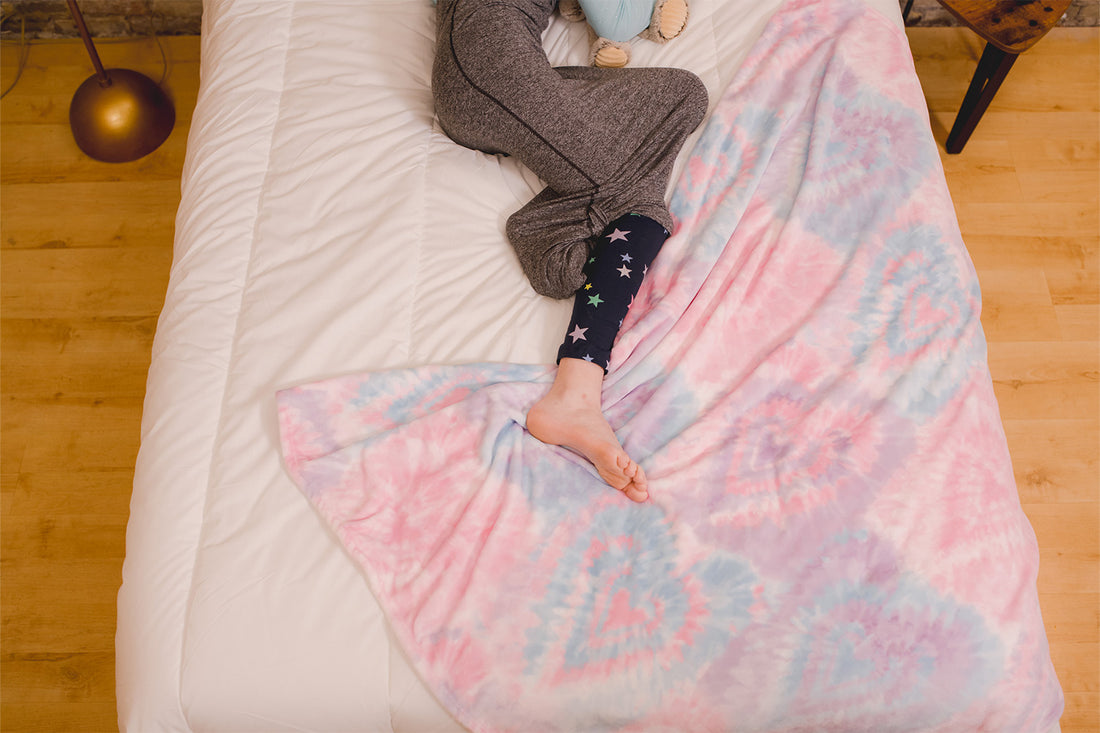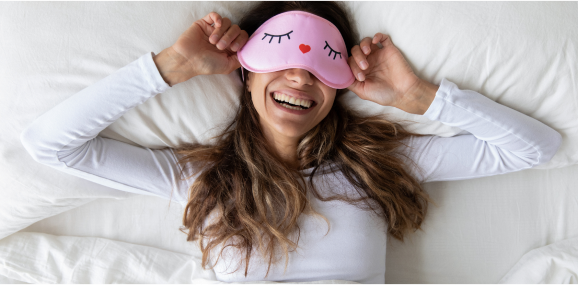It’s happened to everyone at some point: You crawl into bed, with the sheets feeling cool and crisp — perfect conditions are met for a good night’s sleep. But, fast forward later in the night and that perfect sleep oasis feels more like a steamy jungle.
Why does this happen? Why do our bodies get so hot at night?
Well, there are actually a few different reasons that could be causing the sheet sauna and night sweats, from room temperature to hormones, and a few things in between.
Waking Up Hot
Our body follows a natural, 24-hour cycle when it comes to body temperature. Generally, it rises in the mornings, peaks later in the day, and drops in the evening.
Research has shown that people tend to self-select their bedtimes when their body temperature is at the lowest.
Sleep is essential for both our physical and emotional health and well-being. So, ensuring we get our 7 to 9 hours of sleep per night is crucial.
Waking up drenched in sweat can pose a big roadblock to that sleep goal. There are few things more annoying than soggy sheets and sticky clothes. It can make falling back asleep difficult, especially if our sleeping environment feels overheated.
The truth is, there are many different reasons as to why you get hot at night and factors that cause you to wake up in a sweaty stupor.
It could be physiological or environmental, and while the reasons below are not exhaustive, they are typically the most common.
Check the Actual Room Temperature
Two of the major culprits that contribute to overheating at night are room temperature and humidity. There is a good reason people bump down their thermostat at night, most of which has to do with sleeping comfortably. It’s hard to get comfy in a hot, stuffy room.
In fact, sleeping in high temperatures can reduce sleep efficiency. Research has also shown a correlation between higher core temperatures and poor slow-wave sleep, which is the most restorative stage of the sleep cycle.
High room temperatures can induce sweating and higher body temperatures, resulting in soggy sheets and poor sleep. Typically, the optimal sleep temperature is somewhere between 60 to 67 °F.
Sleepwear and Bedding Make a Difference
Another reason you may be getting overheated at night is your bedding choice. Sheets, blankets, comforters, and pillows can impact body temperature, as bedding acts as an insulator.
Thicker bedding traps more heat. The same is true for sleepwear. Heavy sleepwear made from thicker materials can raise body temperature during the night, causing you to wake up drenched in sweat.
The fabric also makes difference. Cotton, wool, and polyester all have different heat-retaining properties. For example, wool tends to be thicker than cotton material, trapping more heat.
Thankfully, the Sleep Pod Move utilizes a specialized, four-way stretch polyspan fabric that is lightweight and breathable for temperature regulation — overheating isn’t an issue, and you get that comfy gentle pressure to keep you snoozing (not sweating) through the night.
Is the bed full?
In addition to bedding and sleepwear, heat from partners or pets in the bed can also cause your body to heat up, as all bodies give off heat as a byproduct of metabolism. So, a full bed could be one reason you’re heating up at night. It might be time to up your bed size or send Fido to his own bed.
Activities Before Bedtime?
What you do before bed does matter and can have quite an impact on your body temperature. Some activities can also hinder quality sleep. For example:
- Caffeine – Consuming caffeine close to bedtime can not only make sleep difficult, but some studies have shown it can also increase your core temperature. This includes caffeine found in coffee, teas, and sodas.
- Working out – Exercise is excellent for your health, but doing it before bedtime could make for a sweaty night. It raises both your heart and your core temperature. If you do work out in the evenings, make sure it’s a couple of hours before bed.
- Stressors - Avoid stressors before bedtime. Stress causes blood vessels to constrict, which can increase core body temperature. Find something relaxing to do before bed, anything to help your wind down (except scrolling on your phone or watching TV — the blue light from those devices can actually keep you awake!).
Certain Medications
Medications can also be the reason your body gets so hot at night. Certain medications can affect how your body regulates temperature (thermoregulation) and could contribute to a rise in body temperature.
Here are some that could affect thermoregulation:
- Some diabetes medications (e.g. insulin)
- Diuretics (e.g. ACE inhibitors)
- Some antibiotics
- Pain relievers
- Steroids (e.g. cortisone)
- Psychotropic drugs
The list could go on and on, but if you think your prescription medication is the culprit that is making bedtime too warm then it may be a good time to consult your doctor.
Physical Bodily Changes — Think Illness or Hormones
Many common illnesses can also cause an increase in your body temperature, making the nights a little too warm. This could include the common cold, bacterial infections, and much more.
Typically, the main cause for this rise in core body temperature is fever, which is your body’s immune response to illness and infection. If you suspect that illness could be the reason you’re experiencing night sweats, it’s best to call your doctor.
Hormone imbalances can also raise core body temperature. For example, many women experience night sweats due to changes in hormone levels — this is typical in menopause when estrogen and progesterone fluctuate, and during pregnancy.
Some Solutions to Stop the Sweats
If the nightly sweats are waking you up at night, some of these tips might help:
- Turning down the thermostat is the most logical place to start if the bedroom itself is causing you to heat up.
- Try a fan to push the cool air around, or open a window.
- Avoid caffeine late in the afternoon or evening.
- Aim to exercise in the morning or afternoon, not close to bedtime.
- Use fewer blankets and make sure you choose lightweight and breathable fabrics.
- Try the Sleep Pod! Its lightweight material and gentle pressure help you stay cool and relaxed in bed.
Conclusion
Waking up drenched in sweat is no fun. Unfortunately, sleeping hot is all too common for many people. The reasons for this can vary, from bedding choice to illness, from medications to exercise.
Thankfully, there are some ways to kick down on the body heat. Cranking down the thermostat, changing out the sleepwear, and kicking out the stress are some great places to start.
Sources:
The Temperature Dependence of Sleep | NIH
How Much Sleep Do I Need? - Sleep and Sleep Disorders | CDC
The Effects of High-Temperature Weather on Human Sleep Quality and Appetite | NIH
Effects of thermal environment on sleep and circadian rhythm | Journal of Physiological Anthropology

































500,000+ happy customers